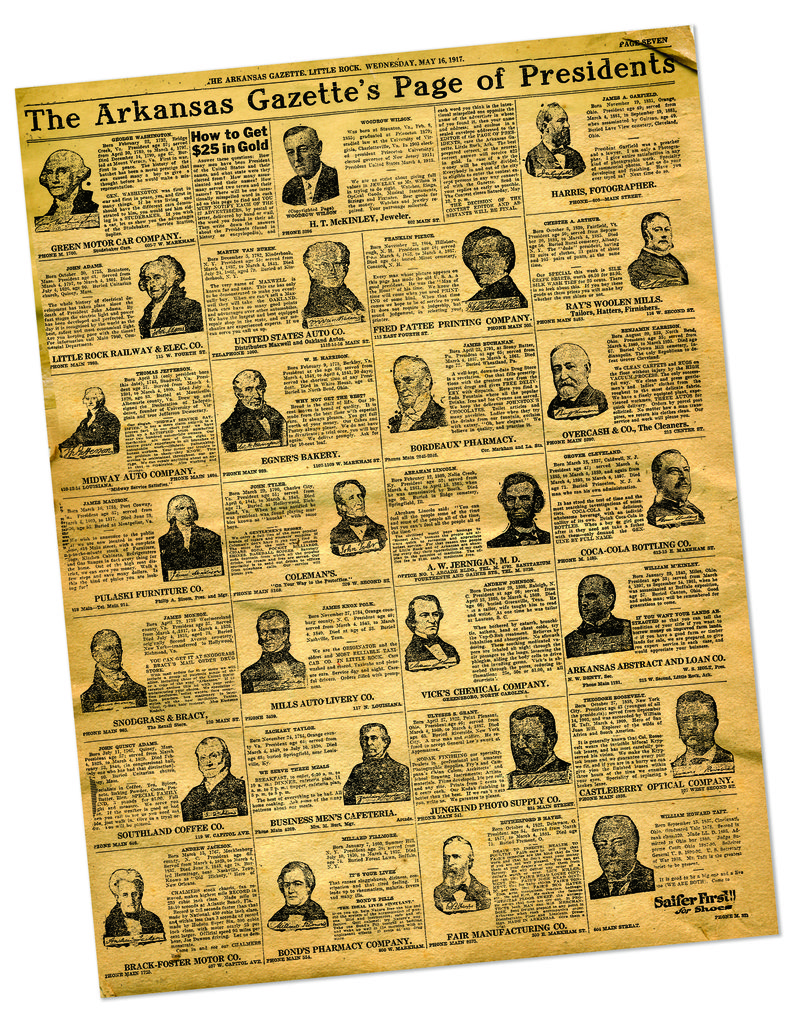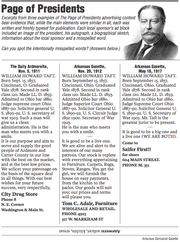On this date 100 years ago, the Arkansas Gazette regaled its readers with the results of an unusual contest: the Page of Presidents.
It was advertising. It gathered 27 two-column-box ads for Little Rock businesses onto one full page pocked with poorly reproduced faces of the 27 U.S. presidents to that date.
Each ad featured one of the presidents and a bit about the sponsoring business. For example, readers learned that President George Washington had been "first in war and first in peace, yes, and first in many things" and if he had been alive in 1917 they would certainly have seen him riding in a Studebaker from Green Motor Car Co. on West Markham Street.
The page conveyed information historic, folkloric, opinionated, potentially lucrative and also bogus, as well as murky images of the presidents' (purported) autographs.
And it was a spelling test.
All at the same time.
The page appeared May 16, 1917, firing the starter gun on a competition for $25 in gold.
At the top of the page, awkwardly divided by the Woodrow Wilson blurb sponsored by H.T. McKinley, Jeweler, instructions spelled out what it took to win:
Answer these questions: How many men have been President of the United States and their names, and what state were they elected from? How many assassinated and their names? How many served two terms and their names?
There will be one intentionally misspelled word in each ad on this page to find and YOU MUST NOTIFY EACH OF THE 27 ADVERTISERS, by postal or letter, delivered by hand or mail, the word you found in their ad. Then write down the answers about the Presidents (found in history or encyclopedia), and each word you think is the intentionally misspelled one opposite the name of the advertiser in whose ad you found it, then your name and address; and enclose in a sealed envelope addressed to the EDITOR of the PAGE OF PRESIDENTS, care the Arkansas Gazette, Little Rock, Ark.
In this age of Google, facts about presidents require little effort, but visiting or sending separate letters to 27 businesses? That still seems like a lot of work for $25.
But what if the prize were $520.33? According to the value calculator at dollartimes.com, that's today's equivalent of what $25 might have bought in 1917.
Which could explain why, on May 22, 1917, the Little Rock newspaper announced that its winning reader was Miss Catherine
Vidor -- of Morrilton, 52 miles northwest of Little Rock. She outdid entries from all over the state and also from Tennessee,
Oklahoma, Texas and Louisiana, including one that came by special delivery from teeny Chrichton station in northwestern Louisiana.
The Gazette received 345 entries, which to us might sound like 345 entries, but which to the unnamed wiz who wrote up the results amounted to 9,660 entries -- on the theory that each of the local businesses also must have received 345 replies.
Vidor's entry wasn't perfect. She made mistakes:
• She said George Washington had served two terms. No, the Gazette explained: "Washington was inaugurated April 30 and only served 7 years, 10 months and 4 days."
Who has ever heard such a quibble raised against Washington? He served two terms. Come on.
• She said Grover Cleveland served one term: "He served two terms."
• Her third mistake was a bit more embarrassing ... for the Gazette.
The third mistake she used the word inexpencive in Bond's Pharmacy Co.'s ad, which was a typographical error, instead of diziness, which was the intentionally misspelled word in that ad.
Ah, yes. The one flaw in this grand plan was the notion that deliberate misspellings would be the only misspellings on the page.
But no harm done, as the report explained:
There were three or four of the inevitable typographical errors, but when the contestant used them in connection with the intentionally misspelled word they were given credit for the [president] in each instance.
WRONG ON PURPOSE
The intentionally misspelled words were suplies, recognised, repairable, refrigeraters, stationary (in context, it was the wrong word), tryed, deemmonstrate, telaphone, promply, sanatary, prompness, pattrons, diziness, judgement, deliceous, civillised, inflamation, garantee, mosquiters, firnishers, equipted, individuallity, buisness, lense, streat, soliceted.
In addition ...
A great many mistook elide, divaricate, speciality, extasy, fother, mete, leek, transpire, hey, distributers, practise, for some of the intentional misspelled words, but they can be found in Webster's dictionary with a definition.
And they still can, 100 years later. But if you go looking, your dictionary had better be unabridged.
BAIT FOR BATED BREATH
The fun of reading the page is very nearly matched by the many advance notices the newspaper published to whip up interest as April marched toward the feature's unstated publication date.
Here's part of the first, published April 22, 1917:
People in general know little about the presidents of the United States. Did you know that Albemarle county, Virginia, has the distinction of having furnished three presidents of the United States?
April 23, 1917:
President Wilson Sends His Photo
One of "The Page of Presidents" was sent to President Wilson and he was asked to give an expression of what he thought of it. He said: "I think the 'Page of Presidents' quite a unique educational feature, as it will cause people to resort to history and encyclopedia to refresh their memory." He also sent a photo of himself to have a cut made from, to use on the page.
Woodrow Wilson.
With courage high and insight clear,
He seeks mad murdercraft to check;
The world aghast with bloody fear.
The savage will to slay and wreck.
Senator Pomerene says: "George Washington had his Tories; Abraham Lincoln had his Copperheads; and Woodrow Wilson has the pacifists and some foreigners. But Washington and Lincoln steered straight ahead -- and so will Wilson."
Mr. Business Man, if you ever wished to show your patriotism, show it now. Don't fail to have an ad on the Gazette's "Page of Presidents" for it will be one time the advertiser will be told by a great many that his ad was read. Everybody in and out of the city is invited to join the contest for the Gazette's $15 cash prize.
Sen. Atlee Pomerene represented Ohio. But the prize would be $25, not $15.
Here's part of the April 24 tease:
Champ Clark, addressing the congregation of a Washington church, on Washington's birthday, declared that George Washington was the "foremost uninspired mortal in the entire history of the human race. ...
"Some may object that Washington occasionally drank a mint julep, bet on a horse race, danced the Virginia reel, and at Monmouth swore because General Lee retreated when ordered to charge. Such things in Washington's day were not looked upon as they are today. I am glad I live after Washington."
Look up "uninspired" in your unabridged dictionary.
While these notices drew attention, some salesman still had to recruit 27 sponsors. Which puts this May 13 notice in a funny light:
The "Page of Presidents" with its $25 cash prize will certainly appear in Tuesday or Wednesday morning's Gazette.
THE GRAND TRADITION
Did the contest spring fully formed from an inventive mind on the Gazette sales staff? If so, it was that mind's second impulse. A very similar feature had appeared in the same paper five years earlier -- Nov. 29, 1912. Same rules, same prize, different sponsors, same presidents.
Its wrap-up report was even more effusive, comparing the vast stack of entries the contest editor and assistant had sorted through to an anecdote told by Herman Ridder in New York [we are not making this up] about a telegram attack by members of the American Newspaper Publishers Association on House Speaker Joe Cannon, regarding some bill relating to the cost of newsprint.
When Mr. Ridder walked in, Mr. Cannon was furious, and accused him in very forcible language of being responsible for the necessity of his going through the stack of telegrams. Mr. Ridder replied: "You know what they say. What's the use of opening them?" Mr. Cannon, "Yes, you [blank space] scoundrel, but there might be an important telegram in the lot."
A few days later in 1912, the paper ran this notice:
As the "Page of Presidents" pleased Gazette readers, the contestants and advertisers, the Gazette will publish in a few days "The Signers of the Declaration" page. It will contain the pictures and autographs of the signers. There will be an intentional misspelled word to find in each advertisement and two or three questions to answer if you wish. Some gold coin. Watch for the page and read the instructions how to get the gold.
No such page appeared through the end of 1912 or the early months of 1913. Considering the Gazette was jam-packed with ads that Christmas, with 14- and 16-page daily sections and 60-page Sunday editions, it hardly seems the in-house sales staff would have wanted extra work.
BUT WAIT -- THERE'S MORE
Evidence even more suggestive against a Gazette-origin theory can be found in the Library of Congress' Chronicling America digital newspaper archive, at bit.ly/2qsiJJB. There was a "Page of Presidents" -- with the same artwork -- Nov. 5, 1911, in The Daily Ardmoreite of Ardmore, Okla.
Ardmore mounted its page one year before the Gazette's first effort.
And after Ardmore in 1911 and Little Rock in 1912, notices about impending Pages of Presidents can be found in the archives of the Greenwood Daily Journal in Greenwood, S.C., in August 1914; Charlotte, N.C.'s Charlotte Observer in November 1914; the Goldsboro Weekly Argus in Goldsboro, N.C., in March 1915; the Wilmington Morning Star in Wilmington, N.C., in February 1915; the Hopkinsville Kentuckian in, where else, Hopkinsville, Ky., in June 1916; The Sun in Pittsburg, Kan., in March 1919 ...
But let's return to The Morning Star of Wilmington, which anyone with a Newspapers.com account can read online. On Oct. 24, 1909, The Star published, complete with similar text, images and contest, "Geo. Martin's Page of Presidents."
Among other information, it gaily informed readers that:
President Taft owns a nice home that belongs to him. Every person who wants to live better should own their own home and stop paying rent. ... J.G. Wright & Son, the rihtg people to do buisiness with.
Ah-ha!
WATCH FOR IT
Over the next few weeks, Style's Old News column will reprint parts of the 1917 Gazette page and learn what we can about this Geo. Martin.
Prepare to hunt for misspelled words.
Arkansas Democrat-Gazette head librarian Michelle Goad and head artist Kirk Montgomery contributed to this report.
ActiveStyle on 05/22/2017

